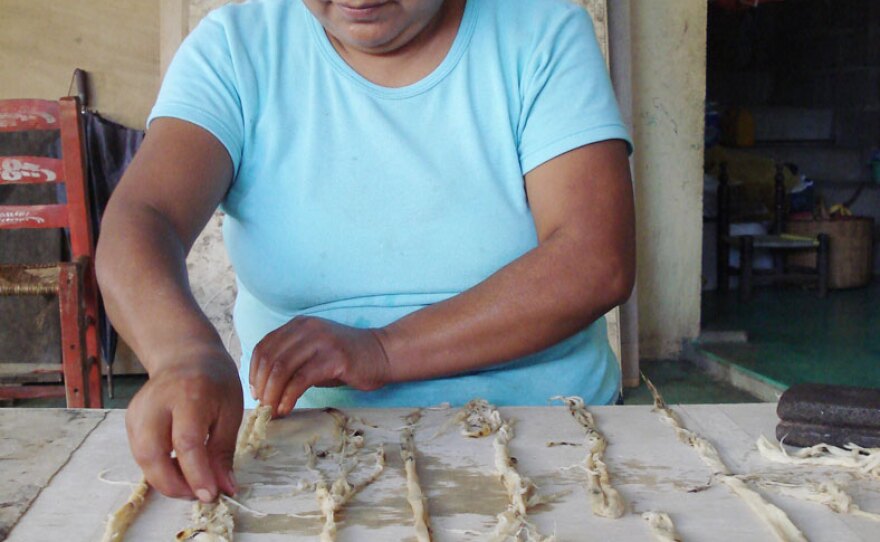In the mountains of central Mexico, the small town of Pahuatlan is hours away from the capital, but it's still closely tied to the global financial system.
Local villagers may not know the name Lehman Brothers — or about the company's collapse that sent the U.S. financial system reeling — but they do feel the effects of what happened in the U.S. economy, says Angel Vasquez, director of AMUCSS, a microfinancing bank project for rural Mexican villages.
One effect of the recession is seen clearly at the local microbank — part of a network of some 550 banks across the country serving rural communities — where remittances come in on the 15th of each month.
A remittance is money a worker makes and sends back home — and it's a cash flow into Mexico that slowed dramatically when the U.S. construction industry collapsed and Mexican workers in the U.S. were laid off last year.
If those workers had returned to Mexico, it would have created a big problem for the country. According to Vasquez, remittances from overseas workers are Mexico's second-largest source of income, after oil.
Reverse Cash Flow
So in the early months of the U.S. crisis, Mexicans sent funds north for the first time, to keep family members afloat. Vasquez says about 30 percent of the customers at the Pahuatlan branch borrowed money to bail out relatives — say, $500 that would allow them to survive for a few months.
The investment paid off. In time, many Mexican workers in the U.S. found other jobs. They often made less money, but it was enough to prevent waves of workers heading home.
Now, monthly remittances are about $100,000 a month, Vasquez says. But that is still down by about 30 percent over the past two years, the steepest drop ever.
Remittance Money At Work
A popular song sums up recent history in the area: Men from villages such as Pahuatlan cross the border illegally to join the American workforce. But the decline in money sent back home has slowed Mexico's recovery from a recession that is twice as bad as in the U.S.

In San Pablito, a mountain village of cinder-block homes and mostly unpaved streets in the central Mexican state of Puebla, it is as if there are no men — they've all gone to the U.S.
Here, the remittance money is at work. The microbank offers loans to start businesses that create jobs.
Successes have been small, but growing. One example is a handmade paper business. Carmela Santos and her extended family borrowed money to grow the company. But that's been hard given the current financial crisis, Santos says.
Still, 22-year-old Mario Cabrera has a job at the company, for now.
"They've been telling us that there's not much work in the United States," Cabrera says. "So, I decided to stay here and work in this business. I just dedicate myself to this."
Pull Of 'Paradise' Across The Border Still Strong
Many young Mexicans made the same decision to stay home, says Demetrios Papademetriou, of the Migration Policy Institute in Washington, D.C.
"Word travels very fast, so that's certainly one of the things that we have learned," he says.
In a three-month study published in September, the institute found that illegal migration from Mexico is down sharply, by about 1 million migrants since 2006, Papademetriou says.
"You have to expect you are going to be pushed back a number of times, but eventually you will come in. But if you made all of this effort and paid all of this money, and you come into the United States and then you don't have a job, it's not really worth it," he says.
But what happens when the U.S. recession fades and the Mexico recovery lags, as economists predict?
At the central bus station in Puebla, Mexico, migrant workers are already headed north, says the Rev. Jorge Galicia Amesqua. His Catholic church is a few blocks away, and he says he sees more and more migrants — from Central America and Mexico — heading to the border.
"Too many young people think that they have to go to the United States to find the paradise," he says. "The idea of the paradise is still in the mind of the people."
Deborah Amos' report comes courtesy of America Abroad, a monthly public radio international affairs program.
Copyright 2022 NPR. To see more, visit https://www.npr.org. 9(MDAzMjM2NDYzMDEyMzc1Njk5NjAxNzY3OQ001))







